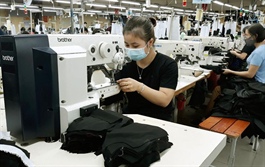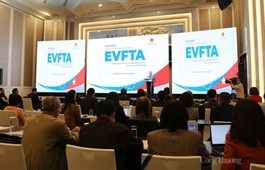Ba Ria-Vung Tau’s adjustment towards high-tech agriculture
Ba Ria-Vung Tau’s adjustment towards high-tech agriculture
Besides focusing on the core goals of developing industries, seaports, and tourism, Ba Ria-Vung Tau province has also identified high-tech agriculture as one of the key factors for the southern province’s economic development over the next few years.
In December, the province launched a high-tech agriculture cooperative in Xuyen Moc district, a home for many tourism and commerce projects. The district is especially favourable for tourism and commerce due to its natural conditions in terms of climate, geography, and human resources, deemed advantages for developing industrial crops and fruit trees with high economic value.
Farmers in the locality have been applying scientific and technical advances, investing in agricultural production to create high economic value, contributing to improving the life standard of their families.
According to statistics from Ba Ria-Vung Tau Department of Agriculture and Rural Development, the southern province as a whole boasted over 430 high-tech crop units as of November, an increase of eight compared to the same period last year. Ba Ria-Vung Tau is cultivating fruit trees, pepper, vegetables of all kinds, melons, and cocoa on over 5,600 hectares, and output in 2022 expected to be a total of over 51,000 tonnes.
The province is currently applying different modern technologies in cultivation including greenhouses, net houses, and advanced water-saving irrigation systems combined with automatic nutrient regulation and hydroponic technology.
Some typical high-tech farms include Phong Thao Agricultural and Pharmaceutical Import-Export, Hoa Lam Company, and Song Xoai Grapefruit Cooperative.
In husbandry, the province now is home to over 120 farms operating with high-tech applications. The technologies being used include a cold barn system, probiotics use, the application of biological padding in livestock, and the use of imported foreign parent breeds. These include groups like Trang Linh and Vinh Tan pig farms.
In the fisheries sector, there are 19 commercial aquaculture and seed production units applying high technology, with a total area of about 412ha.
Technologies are applied including super-intensive biological shrimp farming, circulating and closed water sources, and using modern water purifier systems as well as Israeli farming management and control techniques. All of those technologies are helping the province’s fisheries sector achieve efficiency and increase productivity.
The leading seafood enterprises applying such technologies in the province are Minh Phu Seafood Corporation, Phuoc Hai Seafood JSC, Manh Cuong Aquaculture, Quyet Thang Agricultural Cooperative, Lien Giang and Thai Ha farms, and Vietnam High-tech Seafood.
Modern agricultural production helps units to be proactive in their crops, increase the number of crops in the year, control pests, input agricultural materials, and meet a number of VietGAP safety food standards and ensure the output of the products.
With the goal of becoming one of the high-tech agricultural centres of the country, Ba Ria-Vung Tau has set aside 4,000ha of land in the districts of Chau Duc, Xuyen Moc, Dat Do, and Phu My town to call for investment.
The People’s Committee of Ba Ria-Vung Tau recently issued Decision No.3243/QD-UBND to establish and plan the functional zoning of a high-tech agricultural production area in Chau Duc district. This project aims to form and operate a high-tech agricultural production area and complete the infrastructure system for high-tech application of the district by 2025.
In addition, the province has also implemented policies to encourage the development of cooperation and association in the production and consumption of agricultural products. This cooperation has links between enterprises and farmers via standard models such as VietGAP and GlobalGAP to increase product quality.
Identifying high-tech agriculture development as a key task in the process of implementing agricultural restructuring, the province set out plans for a vision to 2025.
The main objective is to increase its production value and income per unit area of agricultural land by 2025 by 1.5 times compared to 2021; the proportion of high-tech agricultural production value by 2025 will account for over half of the total value; all land plots planned for high-tech agricultural development will be cleared and compensated; and at least five regions and five high-tech agricultural enterprises will be recognised by 2025.


























